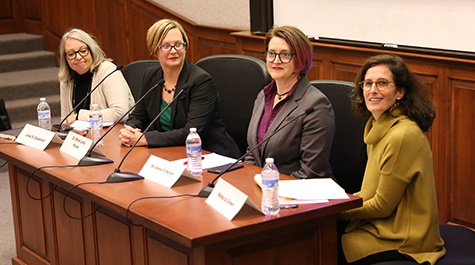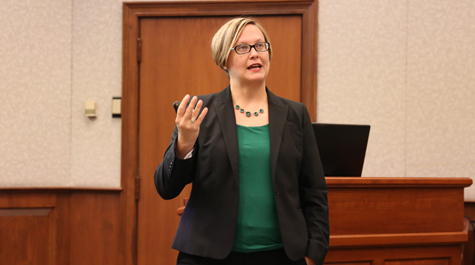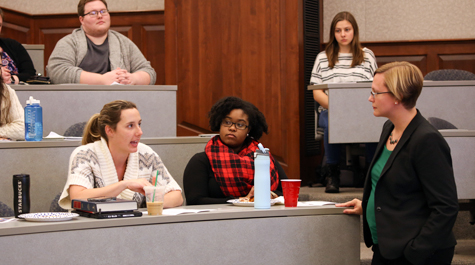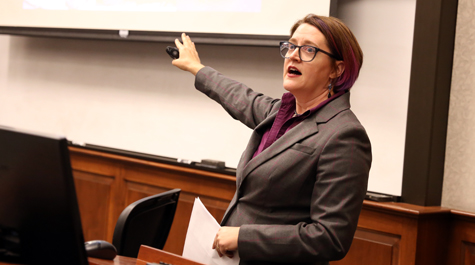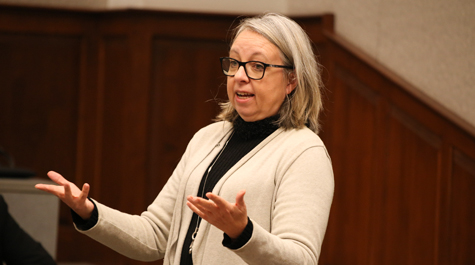Human Security Law Center Holds Symposium on Gender Equality in Elections
William and Mary Law School’s Human Security Law Center welcomed experts for a discussion of “Gender Equality in Elections” on Oct. 29.
Panelists included Dr. Mona Krook, Associate Professor in the Department of Political Science at Rutgers University; Dr. Jennie Burnet, Associate Professor in the Global Studies Institute at Georgia State University; and Julie Copeland, Executive Director of Emerge Virginia. Professor Nancy Combs, Director of William & Mary Law School’s Human Security Law Center, organized the event.
Rebecca Green, Professor of the Practice of Law, and Co-Director of William & Mary Law School’s Election Law Program moderated the discussion.
“I’m thrilled that Professor Combs gathered such a fabulous group to come talk to us today about gender equality and elections,” Green said. “Each of the three speakers joining us today has a unique and interesting perspective on the question of gender and elections.”
Krook began by providing a global perspective on gender and elections based on some of her research and some of the broader data that’s available on the topic. She noted that since the 1995 UN Conference on Women, political representation by women across the globe has more than doubled.
Krook said that electoral gender quotas have been shown to be the most effective of several strategies in terms of jumpstarting women’s political participation in other countries.
“It’s really the motor behind the changes,” Krook said. “This is important because it shows that a deliberate strategy can interrupt existing processes that have been excluding women from elected office.”
Krook noted that women’s participation in politics has doubled in the United States but remains far lower than in the rest of the world. In addition, she noted that her research has shown that women representatives in countries with gender quotas are quite engaged and qualified for their roles.
“Quotas obviously aren’t a panacea to women’s exclusion from politics, but research shows that change in this area doesn’t easily happen on its own,” Krook said. “It’s really something where you need deliberate, concrete measures to advance. Even with progress in women’s participation, we still face what a colleague of mine calls ‘the endless creativity of misogyny.’ Once we finally get women in, that’s not the end of the road; it’s actually just the beginning of this broader contested process to bring women into the political sphere.”
Dr. Burnet followed by asking the question, “Why does Rwanda have the highest representation of women in its Parliament?” She then traced the impact of gender quotas on three realms: descriptive representation (who runs and who wins office), substantive representation (legislative and policy gains that result from increasing protection of women’s rights or extending additional rights to women), and symbolic representation, which is the social changes that gender quotas can bring.
Burnet said that quotas in Rwanda have a significant impact on gendered ideas about the public sphere, and that more women candidates are willing to run when they’re only competing with other women.
“More women running for office can change social ideas about women and their place in society,” Burnet said. “The thing to remember, though, is that cultural change takes time; more women running now might not mean that more women are going to win now, but it might make it easier for more women to engage in the process down the road.”
Looking at that road in the United States with the midterm elections looming on Nov. 6, Julie Copeland shared her thoughts about gender and elections in the United States. Of women’s participation in elected office in the United States, she noted “we’re not just 12th in the world. We’re 99th or 100th last time I checked.”
Copeland reminded the women and men in the room who want to run for office that there are resources out there. She said that it’s important for all of them to get involved and to write some checks.
“There are some statistics that say men give $1,000 and women give $100,” Copeland said. “We give 10 percent of the money; it’s getting better, but we still have to put money on the table for each other as much as possible—and we have to expand our networks.”
Each panelist’s remarks were followed by questions from students, and a final Q&A session before the event’s conclusion.
The Human Security Law Center’s core objective is creating citizen lawyers who have an appreciation for human rights and national security issues. It pursues this goal by educating and exposing students to the interplay between national defense and the protection of civil rights.
About William & Mary Law School
Thomas Jefferson founded William & Mary Law School in 1779 to train leaders for the new nation. Now in its third century, America's oldest law school continues its historic mission of educating citizen lawyers who are prepared both to lead and to serve.
